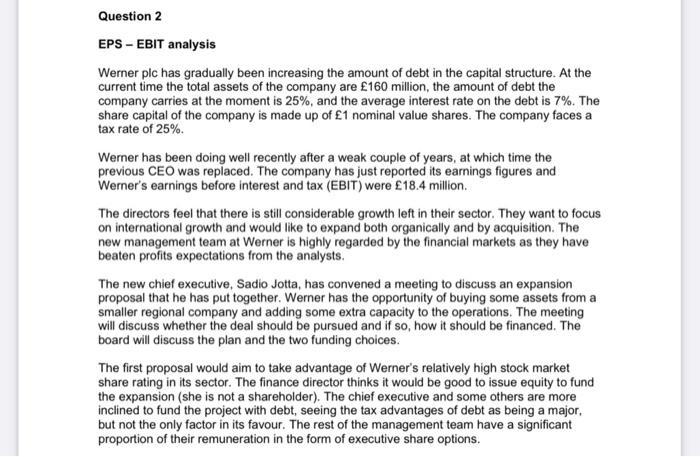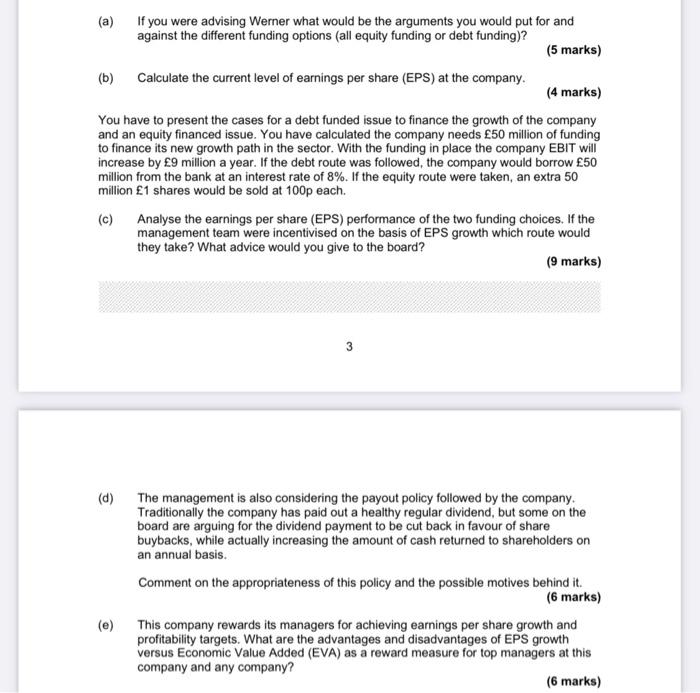EPS - EBIT analysis Werner plc has gradually been increasing the amount of debt in the capital structure. At the current time the total assets of the company are 160 million, the amount of debt the company carries at the moment is 25%, and the average interest rate on the debt is 7%. The share capital of the company is made up of 1 nominal value shares. The company faces a tax rate of 25%. Werner has been doing well recently after a weak couple of years, at which time the previous CEO was replaced. The company has just reported its earnings figures and Werner's earnings before interest and tax (EBIT) were 18.4 million. The directors feel that there is still considerable growth left in their sector. They want to focus on international growth and would like to expand both organically and by acquisition. The new management team at Werner is highly regarded by the financial markets as they have beaten profits expectations from the analysts. The new chief executive, Sadio Jotta, has convened a meeting to discuss an expansion proposal that he has put together. Werner has the opportunity of buying some assets from a smaller regional company and adding some extra capacity to the operations. The meeting will discuss whether the deal should be pursued and if so, how it should be financed. The board will discuss the plan and the two funding choices. The first proposal would aim to take advantage of Werner's relatively high stock market share rating in its sector. The finance director thinks it would be good to issue equity to fund the expansion (she is not a shareholder). The chief executive and some others are more inclined to fund the project with debt, seeing the tax advantages of debt as being a major, but not the only factor in its favour. The rest of the management team have a significant proportion of their remuneration in the form of executive share options. (a) If you were advising Werner what would be the arguments you would put for and against the different funding options (all equity funding or debt funding)? (5 marks) (b) Calculate the current level of earnings per share (EPS) at the company. (4 marks) You have to present the cases for a debt funded issue to finance the growth of the company and an equity financed issue. You have calculated the company needs 50 million of funding to finance its new growth path in the sector. With the funding in place the company EBIT will increase by 9 million a year. If the debt route was followed, the company would borrow 50 million from the bank at an interest rate of 8%. If the equity route were taken, an extra 50 million 1 shares would be sold at 100p each. (c) Analyse the earnings per share (EPS) performance of the two funding choices. If the management team were incentivised on the basis of EPS growth which route would they take? What advice would you give to the board? (9 marks) 3 (d) The management is also considering the payout policy followed by the company. Traditionally the company has paid out a healthy regular dividend, but some on the board are arguing for the dividend payment to be cut back in favour of share buybacks, while actually increasing the amount of cash returned to shareholders on an annual basis. Comment on the appropriateness of this policy and the possible motives behind it. (6 marks) (e) This company rewards its managers for achieving earnings per share growth and profitability targets. What are the advantages and disadvantages of EPS growth versus Economic Value Added (EVA) as a reward measure for top managers at this company and any company? (6 marks) EPS - EBIT analysis Werner plc has gradually been increasing the amount of debt in the capital structure. At the current time the total assets of the company are 160 million, the amount of debt the company carries at the moment is 25%, and the average interest rate on the debt is 7%. The share capital of the company is made up of 1 nominal value shares. The company faces a tax rate of 25%. Werner has been doing well recently after a weak couple of years, at which time the previous CEO was replaced. The company has just reported its earnings figures and Werner's earnings before interest and tax (EBIT) were 18.4 million. The directors feel that there is still considerable growth left in their sector. They want to focus on international growth and would like to expand both organically and by acquisition. The new management team at Werner is highly regarded by the financial markets as they have beaten profits expectations from the analysts. The new chief executive, Sadio Jotta, has convened a meeting to discuss an expansion proposal that he has put together. Werner has the opportunity of buying some assets from a smaller regional company and adding some extra capacity to the operations. The meeting will discuss whether the deal should be pursued and if so, how it should be financed. The board will discuss the plan and the two funding choices. The first proposal would aim to take advantage of Werner's relatively high stock market share rating in its sector. The finance director thinks it would be good to issue equity to fund the expansion (she is not a shareholder). The chief executive and some others are more inclined to fund the project with debt, seeing the tax advantages of debt as being a major, but not the only factor in its favour. The rest of the management team have a significant proportion of their remuneration in the form of executive share options. (a) If you were advising Werner what would be the arguments you would put for and against the different funding options (all equity funding or debt funding)? (5 marks) (b) Calculate the current level of earnings per share (EPS) at the company. (4 marks) You have to present the cases for a debt funded issue to finance the growth of the company and an equity financed issue. You have calculated the company needs 50 million of funding to finance its new growth path in the sector. With the funding in place the company EBIT will increase by 9 million a year. If the debt route was followed, the company would borrow 50 million from the bank at an interest rate of 8%. If the equity route were taken, an extra 50 million 1 shares would be sold at 100p each. (c) Analyse the earnings per share (EPS) performance of the two funding choices. If the management team were incentivised on the basis of EPS growth which route would they take? What advice would you give to the board? (9 marks) 3 (d) The management is also considering the payout policy followed by the company. Traditionally the company has paid out a healthy regular dividend, but some on the board are arguing for the dividend payment to be cut back in favour of share buybacks, while actually increasing the amount of cash returned to shareholders on an annual basis. Comment on the appropriateness of this policy and the possible motives behind it. (6 marks) (e) This company rewards its managers for achieving earnings per share growth and profitability targets. What are the advantages and disadvantages of EPS growth versus Economic Value Added (EVA) as a reward measure for top managers at this company and any company? (6 marks)








